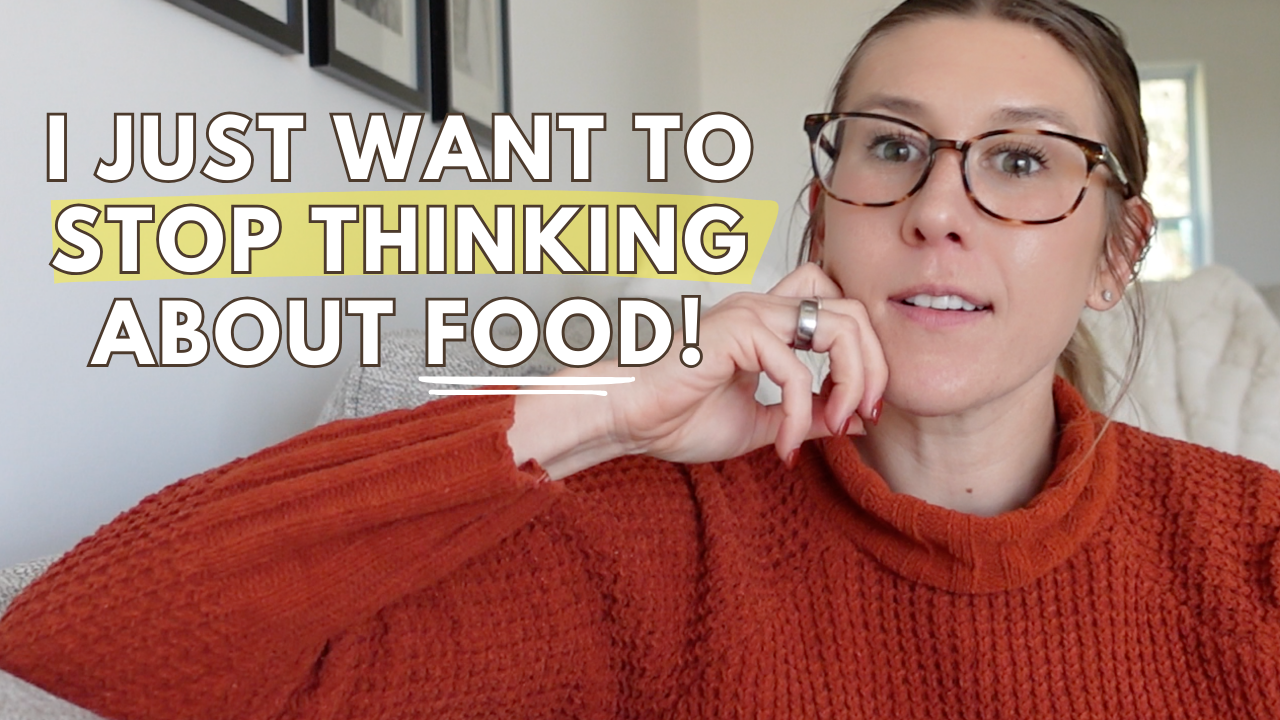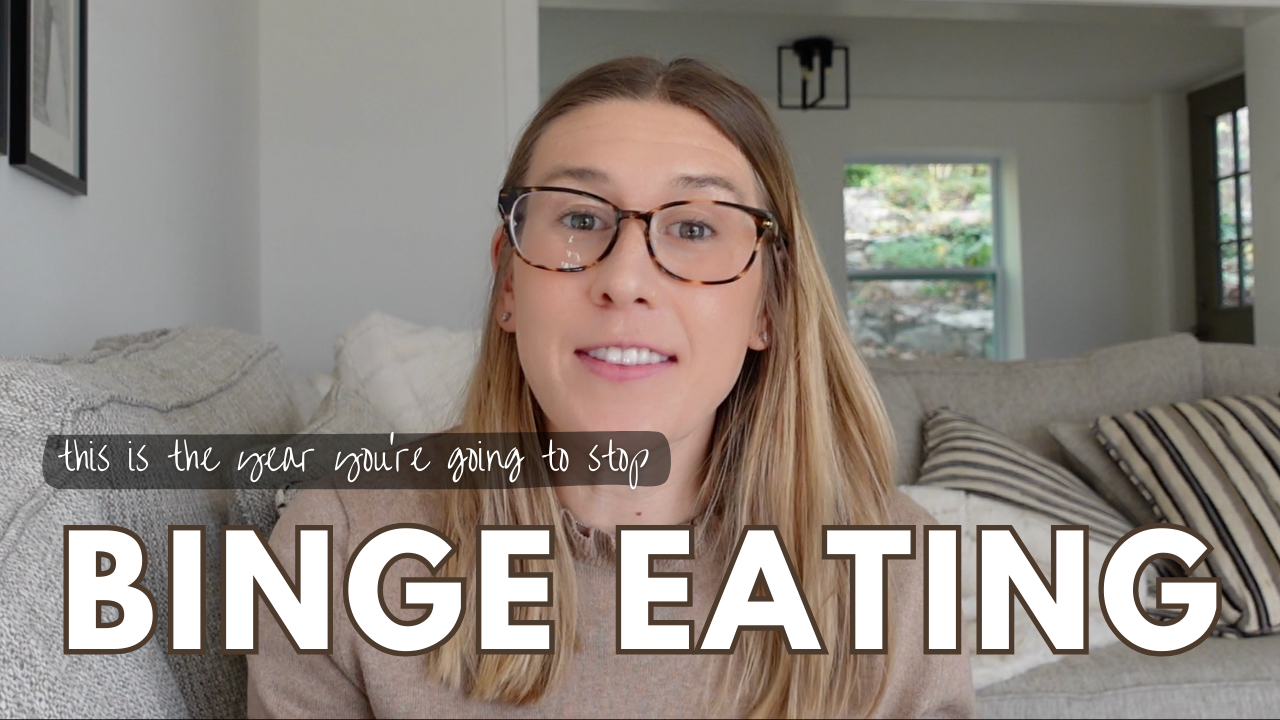Why It’s So Much Harder to Stop Eating at Restaurants
September 24, 2024

Hey There, I'm Ryann Nicole.
I’m a recovered binge eater who changed the story from something that happened to me to something that happened for me. Now, I’m a licensed therapist teaching you to do the same.
My mission? To help you ditch food stress and live your life with mental peace and freedom every single day!
One of the biggest struggles I see—not just with my clients, but with anyone trying to heal their relationship with food—is breaking away from the “good vs. bad” label. It’s so ingrained in our culture to see foods as good or bad that we often don’t realize how deeply these labels affect how we feel and behave around food.
The other day, I was going through my DMs and one question stood out that I knew I had to bring here.

I used to totally struggle with this too. Curious if others felt the same, I posted this question on my story, and—surprise!—100% of you said, “Yes!”
So if you’re nodding along right now, you’re not alone. There’s a reason why you feel compulsive around restaurant food, and it’s probably not what you think.
There’s nothing inherently wrong with eating the entire meal. What I’m interested in is why you feel that once you start, you can’t stop. Why does eating something at a restaurant suddenly feel “bad,” and why does it mean tomorrow needs to be a “good” day?
We Need To Address the Root of Your Compulsive Eating
Giving action steps like “Don’t go to the restaurant overly hungry,” or “Practice mindful eating,” can be helpful. But none of it sticks if we don’t address the root cause of this compulsion. The first thing to understand is that this isn’t a food problem.
Let me tell you a story. When I went to college, I was deep in my binge eating struggles. I thought college would be a fresh start—a way to finally control my food without my family’s comments or shared groceries. I had a limited meal plan and figured that would help me eat less, which would help me lose weight.
You can guess how well that worked. It didn’t matter that I didn’t have much money—I still found ways to binge. Whether it was eating my roommate’s food or sneaking into the cafeteria, nothing I thought would “fix” my eating habits worked.
The compulsion wasn’t really about food, and it’s not for you either.
Understanding The Urge To Keep Eating
Well, think about this: when you’re at a restaurant, maybe even eating the same meal as others, why do you feel compulsive, but they don’t? What’s different for them? What are they thinking that you’re not? Or are they even thinking about food at all?
This is a mindset issue. Your thoughts drive your behavior—It always comes back to your thoughts.
There’s a reason binge eating is in the DSM—it’s psychological. This is why therapy is so important for recovery. Once you accept that this is a mindset issue, you can start looking at the thoughts driving your behavior, why you have those thoughts, and how to shift them. So if you’re feeling compulsive when eating out or eating something ‘bad,’ what’s going through your mind? Where’s your head at? What are you making this mean?
“Why do I feel compelled to eat the entire thing because it’s bad?”
If you were to guess what thoughts you might’ve had while eating this “bad” food, what would you say? Maybe something like:
- Ugh, this is going to ruin my day.
- This is going to make me gain weight.
- I shouldn’t be eating this.
- I’ve ruined my progress.
Sound familiar? And while those thoughts are running wild—“This is wrong,” “I’ve blown it,” “I’m a failure”—you’re probably feeling like crap, right? Guilt, shame, anxiety—all of it piling up. And what comes next? That classic, “What’s the point? I’ll just eat it all so it’s not here anymore, and tomorrow I’ll be better.”
This Is Why You Feel Compelled To Eat It All
It’s easy to brush off how much our thoughts impact our behaviors around food, but it’s real. Research backs this up. When we label foods as “forbidden” or “bad,” it triggers the forbidden fruit effect. The more we try to avoid certain foods, the more we crave them, leading to overeating when we finally give in. It’s like the more we tell ourselves “No,” the more irresistible it becomes, and we end up in that cycle of restricting, craving, and binging.
Here’s how it might look for you:
You’re out for dinner, really want fries, but you’ve labeled them as “bad.” So, you resist. But the whole time, you’re thinking about how much you want them. Eventually, you give in, order the fries, and eat the entire plate because you’ve been avoiding them for so long. Then comes the guilt, and you promise to be “good” tomorrow.
Or maybe, after a meal, you skip dessert because you’ve already hit your calorie limit. But while others enjoy it, you can’t stop thinking about it. Later, you cave and eat it all in a rush, feeling guilty and vowing not to do it again anytime soon.
Studies show that when people categorize foods as good or bad, they’re more likely to feel guilt and shame when eating “bad” foods. And this guilt only fuels the cycle of restriction and bingeing.
Acknowledging Your Binge Eating Patterns
When you eat something you’ve labeled as “wrong” or “bad,” how does it make you feel? Guilty, right? I hear this all the time: “How do I stop feeling guilty after eating?” But the deeper question is: Why do you feel guilty? Why does eating something “wrong” push you into that guilt spiral? And how does that guilt push you to eat even more?
This is the cycle. It’s not the food that’s the problem—it’s the meaning you’re giving it and the mindset behind it. In Binge Eating Unchained, we talk a lot about trying new things—eating differently, moving our bodies, drinking more water, getting more sleep. But when it comes to working on our thoughts, there’s always resistance.
You have proof of how powerful your thoughts are!
It’s ironic, right? Our thoughts are so powerful when it comes to fueling binges. If you want to binge, you make it happen, no matter what. So why aren’t we using that same mental power to work for us instead of against us?
Thoughts like: “Why can’t I stop eating?” or “Why don’t I have more control?” are increasing your shame and guilt, not helping you at all. But here’s the thing—you’re so used to that constant judgment around food that you might not even realize you can question or challenge it.
Let’s go back to that original question:
“Why is it that I’m at a restaurant, eating something bad?” Pause.
What’s bad about it? Why is it bad? How do you define bad?
Next, she says: “I want to finish it all in one sitting.” Pause again.
Why? What happens if you don’t? What happens if you take it home or leave some? What are you afraid of?
And finally: “So tomorrow can be a good day.” Pause one more time.
What do you mean by a good day? Why is today a bad day? Why does your food make or break the day? Can’t you have a good day even if you enjoy a meal at a restaurant, surrounded by family and making memories?
The First Step to Binge Eating Recovery
I’m not asking these questions to be annoying. I’m asking because this is the reflection you need to start breaking free. One of the biggest mistakes people make in trying to recover from binge eating is not reflecting—on their thoughts, their binges, their behaviors. Without that reflection, you can’t become aware of your patterns or challenge the thoughts that aren’t serving you.
And this is basically what therapy is, right? Unpacking what’s happening in your mind, processing your thoughts, reframing them so you can heal.Awareness is the first step to change. I’m going to sound like a broken record here, but you need to hear this:
It’s not about the food. And as long as you keep making it about the food, binge eating wins. It’s about your mindset around food.
Another study in Appetite found that people who approach eating with flexibility—without labeling foods as good or bad—are less likely to binge. So, when you loosen those rigid food rules, you also loosen the grip binge eating has on you.
Think about that restaurant scenario again. Look at the rigidity in your thinking: “This meal means I’ve ruined the day.” That’s some serious pressure on a plate of food! Every decision feels so high stakes.
You are not the problem. Your thoughts are.
But it’s not your fault you think this way. You’ve been taught that if you can’t control your eating, *you’re* the problem. And so the solution feels like fixing the food. But it’s not. So, here’s what I want you to do to actually start healing—grab a journal. I know, I know, you hate journaling. But do you want to heal or keep making excuses?
Okay, let’s get healing. Open that journal to a blank page and start with: “Why am I making every food decision mean so much? What is this really about? What am I afraid of?”
This is the work I do with my clients in Binge Eating Unchained. Because my goal is for you to not need me anymore. And to get there, it’s not just about tools—it’s about understanding the process. Alright, time for you to go journal!
check out the pod
Ways I Can Support You
01 Coaching
Intimate group coaching to break free from binge eating
02 podcast
Real talk on food, mindset shifts, motherhood, and finding peace.
03 support group
A safe space to connect with others on the same journey.
04 free coaching
Have real conversations and hear others share their struggles.
Ryann Nicole
Licensed Therapist, Certified Nutritionist, and Virtual Wellness Coach
Ryann is a licensed therapist and virtual wellness coach who has assisted individuals worldwide in establishing a healthier relationship with food and their bodies.
Are You Ready to Heal Your Relationship With Food?
I understand—it can be overwhelming to figure out where to begin. Let's simplify things and have you start right here:
Why Am I Overeating?
First Steps To Stop Binge Eating
The Ryann Nicole
Podcast
FREE QUIZ
FREE GUIDE
Podcast
the food freedom lab podcast




